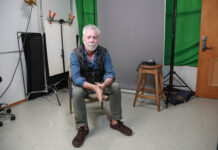Mikhail Goldenberg
Sex is trouble – trouble for your mind, trouble for your peace and quiet. A civilization that builds on the priority of physical development instead of the development of mind, priority of feelings and solutions based on instinct instead of logical thinking, priority of sexual pleasure instead of the most effective cooperation of civilians, is the kind of civilization that will perish.
Michel Houellebecq, who many consider to be the one of the most talented contemporary writers, is trying to make this point in his controversial novel “Elementary particles”.
The narrative follows the lives of two half brothers, Michel Djerzinski and Bruno Clement. They have the same mother, Janine Ceccaldi, who contributes to their upbringing by abandoning them. Bruno is given to his maternal grandmother, and Michel to Janine’s second husband’s mother. Bruno leads the harder life. Abused by his peers, he grows into a perpetually horny adolescence, his sexual advances always denied because he is ugly and devoid of personal charm.
He spends the ’70s and ’80s revealing himself to young girls or masturbating. After his first marriage fails, he meets Christiane at an “alternative” vacation multifaceted with a reputation for free love, and together they go aboard on a flashy swingers’ odyssey. Meanwhile, Michel (whose story is told in counterpoint) is so emotionally isolated that he is unable to kiss his first girlfriend, the amazingly beautiful Annabelle. In university, he loses touch with her and devotes himself to science, finally becoming a molecular biologist. At age 40, he meets Annabelle again.
Nevertheless, as Houellebecq puts it, “In the midst of the suicide of the West, it was clear that they had no chance.” In the end of the book Michel develops the basis for eliminating sex by cloning humans.
“Elementary particles” is a story about unsuccessful attempts to reach happiness. It’s a bittersweet symphony of disappointment, mixed with historical documentary and popular science.
In his second novel, Houellebecq is trying to show the reader his own alternative views on the degradation of Western civilization during the past 50 years. He begins in the ’50s and clearly indicates that the most important part of the degradation process took place during the ’60s, which is supposedly a time of freedom in art and social life, a time of progress and pure happiness.
For Michel Houellebecq the times were an apogee for cults of physical beauty and physical pleasure. The novel’s theme equates sex with consumerism and a bleak fate.
The writer also upholds the Madonna-whore polarization, pigeonholing his female characters with tiresome predictability.
Still, it isn’t the ideology that hampers the narrative – it is Houellebecq’s touted scientific theorizing, which is far from covering fresh ground, resorts to the shibboleths of popular science.
This book shocked France and ignited a passionate debate over the virtues and vices of liberalism. Houellebecq has launched an attack against what he believes to be the decadent culture of the 1960s, which he believes spawned the selfish, narcissistic individualism of contemporary Western civilization. ? ? ?


